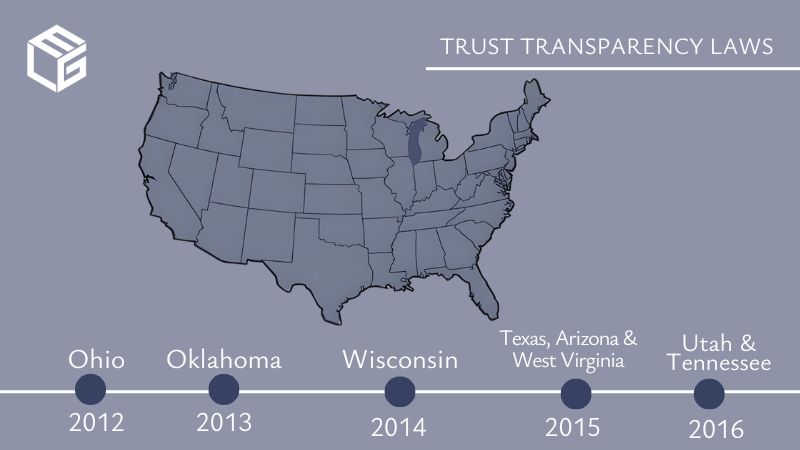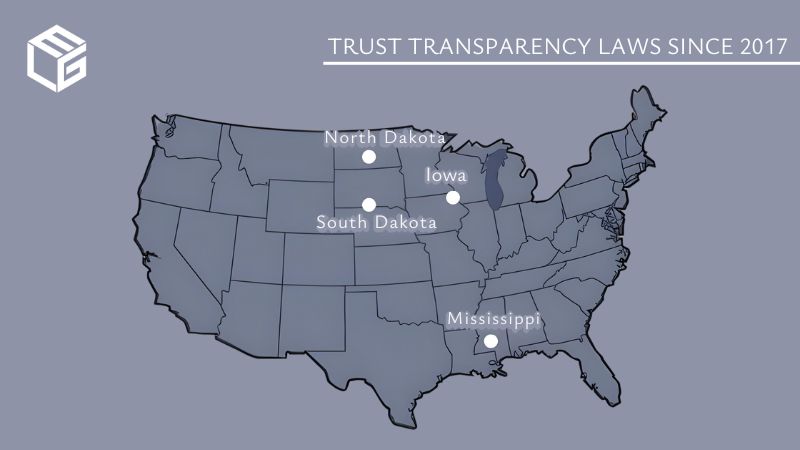Asbestos trust transparency laws are currently effective in 12 U.S. states

Since 1973, when financial compensation was awarded to an asbestos victim for the first time in a lawsuit, asbestos litigation has been on the rise.
As more and more people were developing serious diseases as a result of past occupational exposure, the number of lawsuits filed against asbestos companies increased accordingly.
It was not long before some of the liable companies became unable to pay asbestos victims and were forced to file for bankruptcy protection. This would require their executives to set up asbestos trust funds so that former employees injured by asbestos exposure could still receive compensation. However, asbestos trust funds are separate from state court systems, which makes them susceptible to fraud and abuse.
What do you need to know about asbestos trust transparency?

Because asbestos trust funds function as a distinct entity from state court systems, the assessment of responsibility and apportion liability can occasionally be unobjective.
Similarly, the different requirements the two systems have for individuals who intend to file for compensation, as well as their lack of transparency, can also promote abuse.
To prevent asbestos victims from requesting compensation by both filing a claim with asbestos trust funds and filing a lawsuit, Ohio was the first state to resort to transparency laws at the end of 2012. These are the most important provisions:
- plaintiffs are required to disclose all the claims they have or will file with asbestos trust funds, as well as to provide copies of the documents supporting each asbestos claim, which is no longer privileged information
- plaintiffs will also have to disclose the current status of their asbestos claims and the date each of them was filed
- plaintiffs who fail to comply with the disclosure requirements will face severe consequences, as the court will also be able to impose sanctions
- if a plaintiff files a claim after the resolution of the lawsuit, the court will be allowed to reopen and reduce judgments
- judges can use the plaintiff's asbestos claims and supporting materials as evidence in a trial
- defendants will ensure that plaintiffs file claims with all the available asbestos trust funds
- if a plaintiff files more asbestos claims after the submission of the list, they are required to notify all the other parties within 30 days
One of the major inconveniences of the trust transparency law is that it is the plaintiff who has to prove that a claim cannot be successfully filed with an asbestos trust fund they otherwise qualify.
If they cannot gather appropriate evidence, the court will have to postpone the case until the asbestos claim in question is submitted.
In addition to Ohio, there are 11 other U.S. states in which trust transparency laws are effective:
- Oklahoma
- Wisconsin
- Texas
- Arizona
- West Virginia
- Utah
- Tennessee
- Mississippi
- South Dakota
- Iowa
- North Dakota
Quality legal assistance for victims of asbestos exposure
Although these laws have been quite beneficial for ensuring transparency and minimizing abuse within the system, some argue that asbestos victims in the states above face considerably more difficulty in recovering compensation.
Due to the additional provisions, individuals who seek compensation via civil lawsuits might have to wait longer to receive it.Nevertheless, a recent study - Watching It Work: The Impact of Ohio's Asbestos Trust Transparency Law on Tort Litigation in the State - claims that the transparency reforms enacted in Ohio have not delayed asbestos case resolutions.
Have you or a family member been injured by occupational asbestos exposure? If you suffer from asbestos related cancer, you are eligible for compensation. Our experienced attorneys have successfully helped over 25,000 asbestos victims and are willing to provide you with the same quality legal representation. If you are a veteran struggling with a disease caused by asbestos exposure that occurred in the military, we will need your military records, which you must retrieve, and your medical records so that we can begin reviewing your case.
